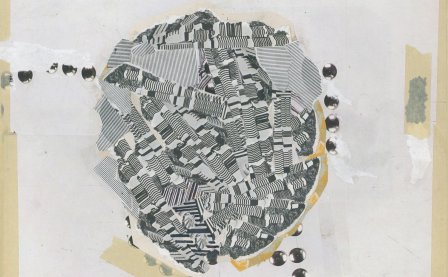Gods of Music nailed it in a write-up of “The Dream Syndicate”:
Drone music is about as far away from music as you can get before it stops being music […] In the beginning, there was the word, and the word was ooooooommmmmmm. God was, apparently, a drone music pioneer, and there is something religious about this music… or rather, something spiritual.
The drone, a slowly evolving sound (or sounds), usually somewhat like a modal fractal set, stands at the opposing end of an absolute dichotomy with silence, while simultaneously dependent on it for its inherent meaning and, therefore, like minimalism, its observable quality. What’s fascinating about music constructed from acoustic or electronic drones is how, despite its susceptibility to scrutiny (which stems from the predominant use of simple base material), it forces the listener to focus on what remains in the composition. For without melody, complex rhythms, or common song-form structures, the details inherent to tone, color, and harmony come to the fore. It’s these details that drone musicians focus on and also what differentiates one from another in a style relatively aurally homogenous — and on Bitchitronics, Bitchin Bajas are no different (and this remark is double-edged, hoo-hah!).
Strictly speaking, it’s worth pointing out that, of the four tracks, not all of the pieces on Bitchin Bajas’ Bitchitronics are exactly “drones,” falling more into line with the musings of the ambient and the psychedelic. What unites them, however, is that inherent spiritual quality that Gods of Music points out. “Turiya,” in particular, derives its name from the Hindu conceptual state of “pure consciousness”, the domain beyond the everyday existence, comprised of waking consciousness, dreaming, and dreamless sleep — the level sought after by practitioners of Hinduism, in a similar vein to many other Eastern and more contemporary “New Age” philosophies. These philosophies are primarily concerned with eradicating the irrational and irrelevant concerns of the modern sentient being, as well as striving to elevate oneself to an ethereal place beyond.
Although Bitchin Bajas recall the earlier periods of experimentation with drones and sine waves of the mid-20th century, they do so with a neo-psychedelic ear similar to AFRIKA PSEUDOBRUITISMUS’ prolific outpouring of absurdist ambient works. Alongside flutes, harps, electric guitars, and harmonium-esque drone material, Bitchin Bajas display electronic manipulation of sounds that bears the revivalist touch — tape-delay effects, not only replicated convincingly but also used effectively to imbue the lush 60s feel with a shimmering quality that taps into the transcendental focus of the style. True to the concerns of drone, all of the instruments are selected and engineered to perfection.
Despite the beauty apparent throughout the album, it’s an inescapable fact that the domain Bitchitronics tackles is well-trodden. For all the grandeur that its track titles conjure — “Transcendence,” “Inclusion,” “Sun City” — keyboard and organ drones aren’t novel areas for experimentation with ambient soundscapes. This would be a serious drawback if the nature of drone music didn’t lend itself to this kind of repetitive use of established instrumentation and soundscapes. Even post-Roxy Music Brian Eno believed his own ambient drone music had to be “able to accommodate many levels of listening attention without enforcing one in particular.”
And that’s the ultimate redeeming quality to Bitchitronics, a record as blissfully insubstantial as it is detailed and observable on a microscopic level; the degrading tones, the warping of timbre, the elevation of pure sound to a spiritual level. Bitchitronics may not be bold or experimental, but that’s irrelevant to Bitchin Bajas’ concerns — that being the craft of pure sound, as Eno put it, “ignorable as it is interesting.”
More about: Bitchin Bajas




